This easy to follow 10 steps guide will show you exactly how to pray the Janazah prayer according to the Sunnah.
All references provided are from the authentic (sahih) and reliable (hasan) hadith of the Prophet (peace be upon him).
The sections are color coded to make it easy to follow:
- Arabic: The recitations of the verses of the Quran and du’as from the Sunnah in Arabic
- Transliteration: The transliteration (pronunciation) of Arabic verses and duas in English
- Translation: The meaning of the recitations and duas translated into English
- Optional: These are optional Sunnahs which you may choose to leave if you want. The Janazah prayer is still complete without them
- Evidence: The evidence from the Qur’an and Sunnah of the Messenger (peace be upon him) for this practice
10 Easy Steps on How to Pray the Janazah Prayer
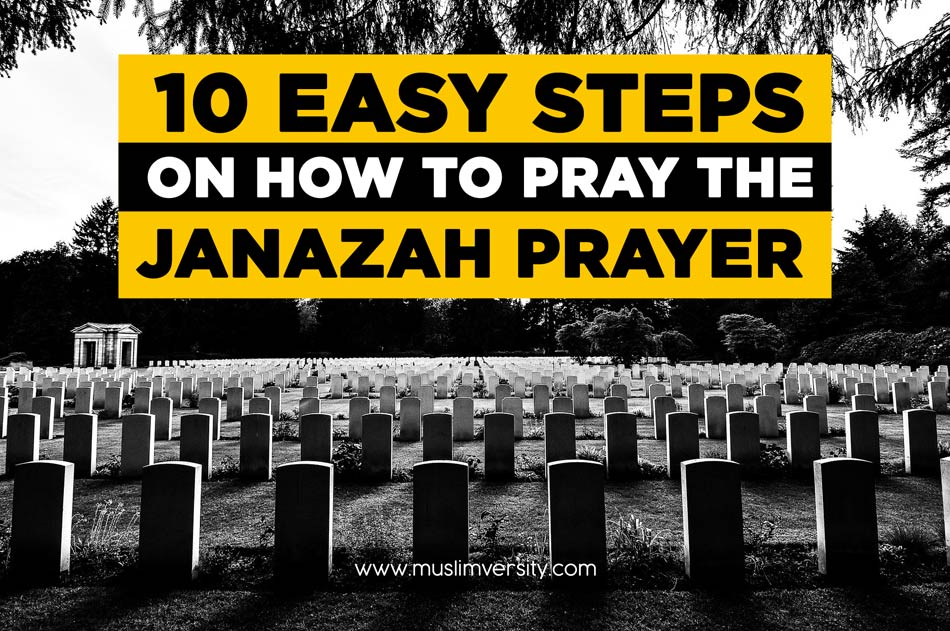
Step #1 – Preconditions of the Janazah Prayer
- Make sure you have wudu and face the qiblah just like any other prayer.
- The body of the deceased should already be washed and shrouded and placed in front of the congregation.
- There is NO Adhan or Iqamah for the Janazah Prayer. The congregation will line up and the prayer will simply start with the first takbeer (Allahu Akbar).
- There is NO prostration (sajdah/sujood) or bowing (ruku) in the Janazah prayer. So do not leave a gap in front of you as you would do in a normal prayer for prostration. You will not be bowing down at any point. Stand close to the person in front of you. A foot apart from the person in front is okay.
- Stand shoulder to shoulder, feet to feet to the person either side of you as prescribed in the sunnah.
- The Janazah prayer is a silent prayer except for the takbirs (Allahu Akbar) and taslim (salam) at the end.
- If the deceased is a man/boy the Imam will stand in level with the head of the person.
- If the deceased is a woman/girl, the Imam will stand in the middle.
Step #2 – The First Takbir
The Janazah prayer is only one rakah (unit). There are four takbirs (saying Allahu Akbar loudly) in the Janazah prayer all in the same rakah.
The Imam leading the Janazah prayer will say the first takbir out loud (i.e. Allahu Akbar).
Follow the Imam and raise your hands up to the ears or shoulders and then fold them. Placing the right hand over the left just like you would do in the normal five daily prayers.
Those who follow the Hanafi school of thought raise their hands up to the ear lobes and fold them around the navel.
The Maliki will leave their arms hanging to their sides.
The Shafi and Hanbalis will generally raise their hands to the shoulder level and fold them on the chest.
All methods are acceptable with evidence found in the Sunnah.

Evidence: Four Takbirs
Narrated Abu Huraira:
Allah’s Messenger (peace be upon him) informed us about the news of the death of An-Najash on the day he died. He went out with us to the prayer area and we aligned in rows and he said four takbirs (Allahu Akbar) for the funeral prayer.
[Sahih al-Bukhari • Book 23, Hadith 89 • Graded Authentic]
Evidence: Raising hands for starting the prayer
Narrated Salim bin `Abdullah (may Allah be pleased with him):
My father said, “Allah’s Messenger (peace be upon him) used to raise both his hands up to the level of his shoulders when opening the prayer”
[Sahih al-Bukhari • Book 10, Hadith 129 • Graded Authentic]
Step #3 – Seek Refuge in Allah from Shaytan
Before reciting the Qur’an first seek refuge in Allah from Shaytan (Satan) the accursed.
Recite this silently.
The dua for seeking refuge from Shaytan is as follows:

Evidence: Seek refuge in Allah
So when you recite the Qur’an, (first) seek refuge in Allah from Satan, the expelled (i.e. the accursed). – [Quran 16:98]
Source: https://quran.com/16/98
Step #4 – Recite Surah Al-Fatiha
Recite the first chapter of the Qur’an – The Opener (Surah Al-Fatiha)
Recite this silently.
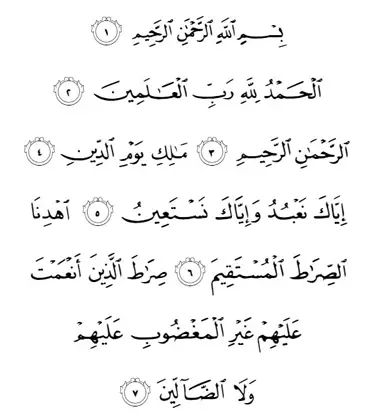
Evidence: Reading Surah Al-Fatiha
Narrated Talha bin Abdullah bin Auf:
I offered the funeral prayer behind Ibn `Abbas (the cousin of the Prophet). He recited Surah Al-Fatiha and said, “You should know that it (i.e. recitation of Al-Fatiha) is the tradition of the Prophet Muhammad (peace be upon him).
[Sahih Al-Bukhari • Book 3, Hadith 32 • Graded Authentic]
Step #5 – The Second Takbir
The Imam leading the Janazah prayer will say the second takbir out loud (i.e. Allahu Akbar).
It is Sunnah to raise your hands to the level of the shoulders with every takbir in the five daily prayers. From this the scholars say it is preferable to raise your hands with every takbir in the Janazah prayer too.
Raise your hands to the shoulders/ears when the Imam says takbir. Then fold your hands.
The Hanafi school of thought in general does not raise their hands after the first takbir. This is a difference of opinion among the scholars.

Evidence: Raising the hands with takbir
Narrated by Salim bin `Abdullah who reported that his father said:
“Allah’s Messenger (peace be upon him) used to raise both his hands up to the level of his shoulders when starting the prayer. And on saying the Takbir for bowing. And on raising his head from bowing he used to do the same and then say “Sami`a l-lahu liman hamidah, Rabbana wa laka l-hamd.” And he did not do that (i.e. raising his hands) in prostrations”
[Sahih Al-Bukhari • Book 10, Hadith 129 • Graded Authentic]
Step #6 – Recite Salutations on Prophet Muhammad and his family
Next pray to Allah to send His peace and blessings upon Prophet Muhammad (peace be upon him) and his family. Similar to how you would do in the five daily prayers while in the sitting position.
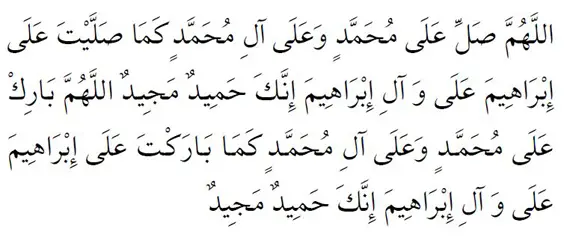
Step #7 – The Third Takbir
The Imam leading the Janazah prayer will say the third takbir out loud (i.e. Allahu Akbar).
Raise your hands to the level of the shoulders/ears when the Imam says takbir. Then fold your hands.

Step #8 – Supplicate (Du’a) for the deceased
Now you will supplicate to Allah and seek forgiveness and mercy for the deceased.
The Prophet (peace be upon him) would make various supplications (duas) for the deceased. Some of them I have mentioned below from the Sunnah.
If you find it difficult to memorize duas in Arabic then in the simplest form you can just repeat:

The Janazah prayer is a communal obligatory prayer NOT an individual obligation. Since it is not an individual obligatory prayer it is permissible to make dua in any language in the funeral prayer.
So this du’a portion of the prayer can be in any language you are familiar with.
The main emphasis here is not the language of your dua as Allah understands all languages. It is your sincerity and humility.
Whether you make dua in Arabic or English, know that salah (prayer) is an act of devotion and sincerity. So sincerely beseech Allah to forgive the deceased when you supplicate for them.
Evidence: Sincere supplication for the deceased
Narrated by Abu Hurayrah (may Allah be pleased with him):
The Prophet (peace be upon him) said: When you pray over the dead, make a sincere supplication for him.
[Sunan Abi Dawud • Book 21, Hadith 111 • Graded Reliable (Hasan)]
Below are some duas from the Sunnah which the Prophet (peace be upon him) would pray for the deceased.
Sunnah Du’a #1
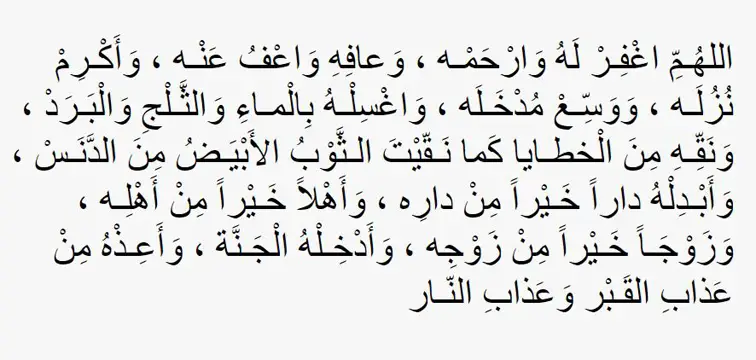
Evidence:
‘Anas b. Malik said:
I heard the Prophet (peace be upon him) say (while offering prayer on a dead body):
O Allah! forgive him, have mercy upon him. Give him peace and absolve him. Receive him with honour and make his grave spacious. Wash him with water, snow and hail, cleanse him from faults as is cleaned a white garment from impurity. Requite him with an abode more excellent than his abode, with a family better than his family, and with a mate better than his mate, and save him from the trial of the grave and torment of Hell.
‘Auf b. Malik said: I earnestly desired that I was the dead person to receive the prayer of the Messenger of Allah (peace be upon him) as this dead body had (received).
[Sahih Muslim • Book 11, Hadith 111 • Graded Authentic]
Sunnah Du’a #2
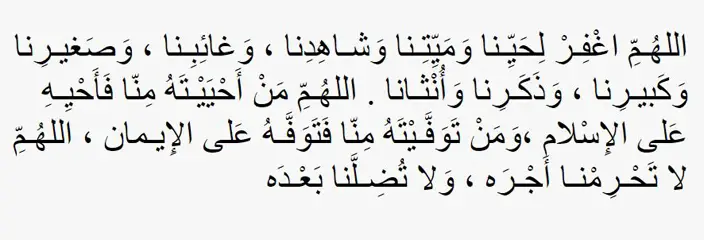
Evidence:
Narrated by Abu Hurayrah:
When the Messenger of Allah (peace be upon him) prayed over a dead person, he said:
O Allah, forgive those of us who are living and those of us who are dead, those of us who are present and those of us who are absent, our young and our old, our male and our female. O Allah, to whomsoever of us You give life, grant him life as a believer, and whomsoever of us Thou takest in death take him in death as a follower of Islam. O Allah, do not withhold from us the reward (of faith) and do not lead us astray after his death.
[Sunan Abi Dawud • Book 21, Hadith 113 • Graded Authentic]
Step #9 – The Fourth Takbeer
The Imam leading the Janazah prayer will say the fourth and final takbir out loud (i.e. Allahu Akbar).
Raise your hands to the level of the shoulders/ears when the Imam says takbir. Then fold your hands.
You may continue to seek forgiveness and supplicate for the deceased if the Imam is silent for a while.
Usually the Imam will proceed to conclude the Janazah prayer after a short pause. This is because the Prophet (peace be upon him) said to hasten the burial.

Evidence:
Narrated by Abu Huraira:
The Prophet (peace be upon him) said “Hurry up with the dead body (i.e. hasten the burial of the deceased). For if it was righteous, you are forwarding it to welfare. And if it was otherwise, then you are putting off an evil thing down your necks.”
[Sahih al-Bukhari • Book 23, Hadith 73 • Graded Authentic]
Step #10 – End the Prayer with Taslim
The Imam will conclude the Janazah prayer by turning his head to the right and saying the Taslim. Follow the imam and turn your head to the right and say “As-salāmu ‘alaykum wa rahmatullāh”.

The authentic hadīth in Ad-Daruqutni and Al-Hakim state the Prophet only did taslim to the right once. So doing taslim to the right once is an obligation.
Other narrations mention the Prophet (peace be upon him) did salam to the left.
Hanafis combine the hadith and do salam on both the right and left side. Both are acceptable and references can be found in the Sunnah.
Ultimately you’ll be following the imam in Janazah prayer. So if the Imam does one taslim, then turn to the right. If he does two then you’ll be doing it on both sides.
Other Sunnahs of the Funeral Prayer
If the deceased is a man/boy the Imam will stand in level with the head of the person. If the deceased is a woman/girl, the Imam will stand in the middle. This is from the Sunnah of the Messenger (peace be upon him).
Abu Ghalib narrated:
“I prayed for the funeral of a man with Anas bin Malik, so he stood parallel to his head. Then they came with the body of a woman from the Quraish. They said: ‘O Abu Hamzah perform the prayer for her.’ So he stood parallel to her waist. Al-Ala bin Ziyad said to him: ‘Is this how you saw the Messenger of Allah standing in the place for the funeral as you did for her, and for a place that you stood for the man?’ He said: ‘Yes.’”
[Jami` at-Tirmidhi • Book 10, Hadith 70 • Graded Reliable (Hasan)]
The Purpose of the Funeral Prayer
The purpose of the funeral prayer it is a time to seek forgiveness for your Muslim brother or sister who has just passed away.
The Prophet (peace be upon him) attached great relevance to the number of believers attending a funeral prayer. The significance of it being that if a person did much good to his community then more people would want to attend his funeral.
‘Abdullah b. ‘Abbas the cousin of the Prophet said:
I heard Allah’s Messenger (peace be upon him) as saying. “If any Muslim dies and forty men who associate nothing with Allah stand over his prayer (i.e. they offer prayer over him). Allah will accept them as intercessors for him.
[Sahih Muslim • Book 11, Hadith 77 • Graded Authentic]
Attending the funeral of a believer is also one of the rights of a Muslim upon us. The Prophet (peace be upon him) emphasized to follow the funeral procession is the right of your Muslim brother.
It would not make sense to follow the procession and then not pray the Janaza prayer. So following the funeral procession includes attending the Janazah prayer afterwards.
Narrated Abu Huraira:
I heard Allah’s Messenger (peace be upon him) saying. “The rights of a Muslim on the Muslims are five. To respond to the salaam, visiting the sick, to follow the funeral processions, to accept an invitation, and to reply to those who sneeze”.
[Sahih Al Bukhari • Book 23, Hadith 4 • Graded Authentic]
Virtues of attending the Janazah Prayer
The virtues of the funeral prayer are many. Besides seeking forgiveness for the deceased the funeral prayer is also a time for self reflection. Attending the funeral prayer and graves of the deceased softens the heart and humbles you.
It is a reminder that you will also die one day and stand in front of your Lord. So make sure to use this time to re-analyze your own life and deeds. And what you will take to the grave with you.
Abu Huraira (may Allah be pleased with him) reported:
The Apostle of Allah (peace be upon him) said “Visit the graves, for that makes you mindful of death”.
[Collected by Sahih Muslim • Book 11, Hadith 135 • Graded Authentic]
Al-Barā (may Allah be pleased with him) narrated:
“We were with the Messenger of Allah (peace be upon him) at a funeral, and he sat at the edge of the grave weeping, until the ground became wet. Then he said: ‘O my brothers, prepare yourselves for something like this.’”
[Sunan Ibn Majah • Vol. 5, Book 37, Hadith 4195 • Graded Hasan (Reliable)]
There is also a great reward for attending the funeral prayer. The Prophet (peace be upon him) told us the rewards are equal to two huge mountains. So attending the funeral prayer is a time to get easy reward for your own reckoning.
Narrated by Abu Huraira:
Allah’s Messenger (peace be upon him) said. “Whoever attends the funeral procession till he offers the funeral prayer for it, will get a reward equal to one Qirat. And whoever accompanies it till burial, will get a reward equal to two Qirats.” It was asked, “What are two Qirats?” He replied, “Like two huge mountains.”
[Sahih al-Bukhari • Book 23, Hadith 82 • Graded Authentic]
Conclusion
Death is the inevitable reality. It is the only thing that is certain for everyone. Regardless if you’re a man or woman, young or old, dark skin or fair skin, rich or poor. One day we all will die. Allah the Most High says in the Qur’an:
“Every soul will taste death” – [Qur’an 3:185]
It is also likely that in our lifetime we all will know someone who dies and we’ll have to attend their Janazah prayer (Funeral Prayer). Therefore it is important for every Muslim to know how to pray the Janazah prayer according to the Sunnah.
There are some differences in narrations regarding the funeral prayer. Don’t let differences in fiqh cause friction among your brothers. Especially at the time of someone’s funeral. Your main focus should be seeking forgiveness for the deceased and pondering over your own death.
If you’ve benefited from this guide then please share it with others.
And Allah The Most Knowledgeable knows best.